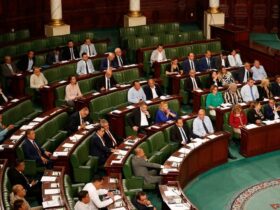The campaign was marred by allegations of opposition intimidation and concerns about electoral fraud.
Elvis Amoroso, the head of the National Electoral Council (CNE), which is known for its pro-Maduro stance, reported that opposition candidate Edmundo González Urrutia received 44.2 percent of the vote.
In Caracas, Venezuela, the opposition has claimed victory, setting the stage for a clash with the government, which has already declared Maduro the winner. Opposition candidate Edmundo González made a statement, asserting that “Venezuelans and the entire world know what happened”.
Opposition leader María Corina Machado described González’s victory margin as “overwhelming”, based on preliminary voting data from about 40 percent of the polling stations nationwide.
The CNE, dominated by Maduro loyalists, announced that Maduro had won with 51 percent of the vote compared to González’s 44 percent.
However, the council has yet to release detailed results from each of the 30,000 polling stations, only promising to do so in the “coming hours,” which has complicated efforts to verify the results.
U.S. Secretary of State Antony Blinken expressed “serious concerns” that the announced results do not reflect the true will of the Venezuelan people.
Foreign leaders have been hesitant to recognise the results, with Chile’s Gabriel Boric criticising the results as hard to believe and demanding verifiable evidence.
The delay in result announcements—six hours after polls were supposed to close—suggests internal government disagreements on how to handle the situation after Maduro’s opponents claimed early victory.
When Maduro finally addressed his supporters, he accused unidentified foreign adversaries of attempting to tamper with the voting system, though he offered no evidence to support this claim. He promised “justice” for anyone inciting violence in Venezuela.
Maduro, seeking a third term, faced a significant challenge from González, a retired diplomat who was relatively unknown before being selected in April as a last-minute replacement for María Corina Machado.
Machado, a prominent opposition figure, was barred by the Maduro-controlled Supreme Court from running for any office for 15 years. After she was prevented from joining the presidential race, González, a political newcomer, was chosen as her substitute.
The ballot also included eight other candidates, but only González posed a serious threat to Maduro’s rule.
After voting, Maduro pledged to recognise the election results and urged other candidates to do the same, stating, “No one is going to create chaos in Venezuela.” He promised to adhere to and ensure recognition of the official announcements.
Venezuela, home to the world’s largest proven oil reserves, once boasted one of Latin America’s most advanced economies.
However, under Maduro’s leadership, the country has faced economic collapse, with oil prices plummeting, severe shortages, and hyperinflation exceeding 130,000%. This has led to widespread social unrest and mass emigration.
The U.S. sanctions, aimed at ousting Maduro following his controversial 2018 re-election, have further exacerbated the crisis. Despite Maduro’s campaign promises of economic stability and improvement, many Venezuelans have seen little change in their standard of living, with many earning less than $200 a month and struggling to afford necessities.
González and Machado concentrated their campaigns on Venezuela’s rural areas, promising to create jobs and encourage the return of Venezuelans living abroad to reunite with their families.









Got a Question?
Find us on Socials or Contact us and we’ll get back to you as soon as possible.